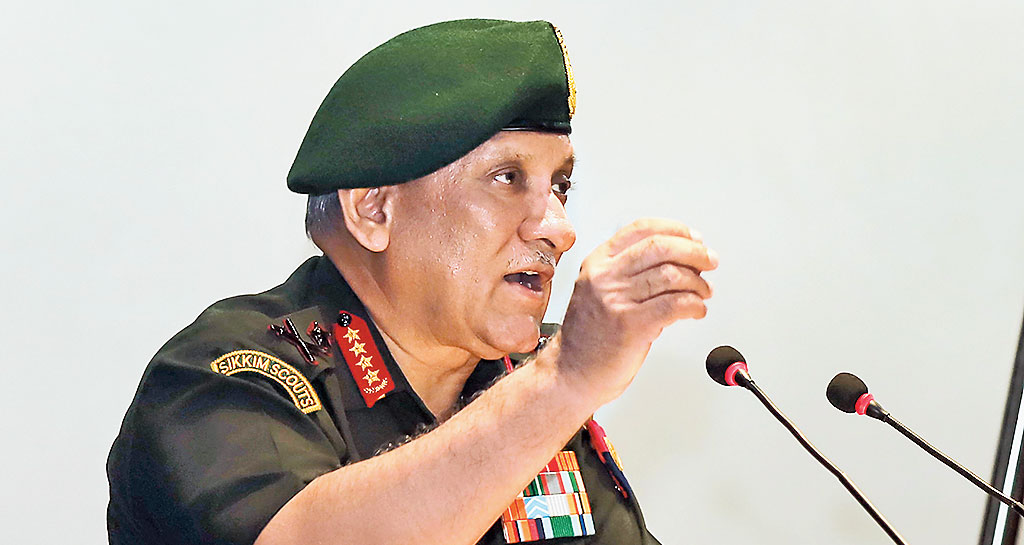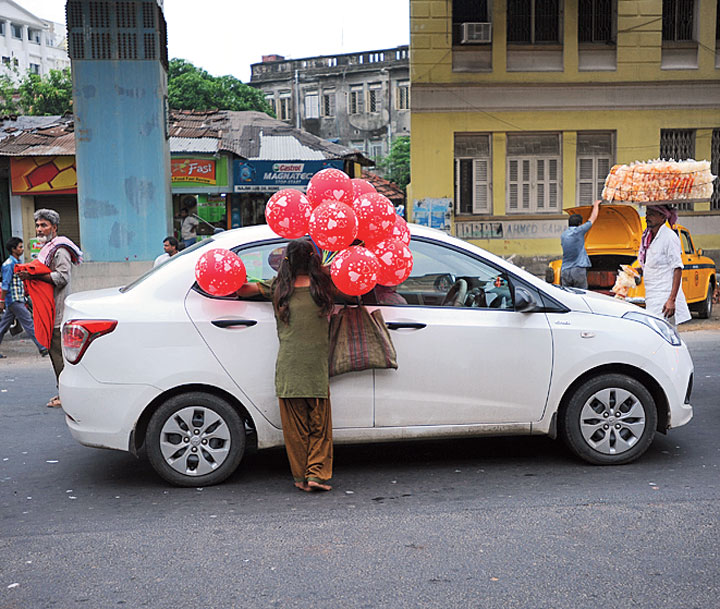Sir — During the festive season, people are often more charitable than usual. To share their joy with the less fortunate, some people offer food to those begging on the street, or buy wares that they do not really need. These gestures are heartening. Yet, one must admit that a one-time act of charity is not sufficient to improve the quality of the lives of the underprivileged. Given that we have just stepped into a new year, all of us should resolve to think of more sustainable ways to make the world a kinder place. Joining or volunteering at a non-governmental organization of one’s choice could be the first step towards achieving this.
Ayesha Dasgupta,
Calcutta

Bipin Rawat’s remark sought to malign a people’s movement, as he highlighted only the charges against the protesters. He did not speak a word to condemn police brutality in universities or upon the Muslim community in Uttar Pradesh and other BJP-ruled states. (PTI)
For shame
Sir — The former army chief and new chief of defence staff, Bipin Rawat, is given to making unwarranted and controversial statements. Yet, he ends up in the good books of the ruling dispensation. This time, Rawat drew a lot of flak for his remark condemning the ongoing protests against the Citizenship (Amendment) Act. His comment about students and “masses of crowds” being led to committing arson seems like an attempt to show his support for the Narendra Modi-led government. In fact, Rawat often speaks more like a political leader than as the chief of the defence forces — the newly-created office he has now been selected for. But even if this were not the case, it seemed likely that he would have joined the Bharatiya Janata Party after his retirement, like V.K. Singh and S. Jaishankar did before him.
Rawat’s remark sought to malign a people’s movement, as he highlighted only the charges against the protesters. He did not speak a word to condemn police brutality in universities or upon the Muslim community in Uttar Pradesh and other BJP-ruled states. In this, he seems to share the BJP’s resentment against students, India’s largest minority community, and all upholders of secularism and equality.
According to the Army Rules, an officer in service should not make political comments. As such, Rawat should have refrained from trying to dictate how political leaders should act or how civilian struggles should be conducted. One can compare the traditionally apolitical status of the Indian army with the role of the army in Pakistan’s politics to understand how the politicization of the armed forces could be detrimental to a democracy. The service of civilians should be the prerogative of the defence forces. The Indian defence units should not be reduced to being an arm of the ruling party either. Rawat must apologize to the nation for demeaning his chair by interfering in domestic politics.
G. David Milton,
Maruthancode, Tamil Nadu
Sir — Bipin Rawat has embroiled himself as well his chair in a controversy by commenting on the protests against the CAA. His remark was nothing but a display of his loyalty to the prime minister, Narendra Modi, when his office dictates that he should actually be loyal to the people of India.
Rawat’s recruitment as army chief in 2016 was controversial in itself, since it was only the second time in 33 years that the government went against the tradition of selecting the senior-most general for the top post. Since then, he has been courting controversy, whether for his comments on protesters in Kashmir or for his praise of Leetul Gogoi, who had used a Kashmiri civilian as a human shield. Rawat seems to believe that citizens should be afraid of the army.
Abhijit Chakraborty,
Howrah
Sir — Most of the army chiefs of India have shown impartiality and decorum in their words and deeds. They never behaved as advocates of any political party, religion or region, and upheld the dignity of their office.
Unfortunately, that tradition seems to have been broken. Bipin Rawat, who was the army chief until last month, set a bad precedent by criticizing the nationwide protests against the National Register of Citizens and the CAA. It is unbecoming of his chair to comment on the internal affairs of the country. Further, his remark seemed to be a show of his allegiance to the ruling party at the Centre. Rawat has now been declared the chief of defence staff.
Venu G.S.,
Kollam, Kerala
Sir — The comment made by Bipin Rawat on the agitation by university students has rightly been decried by many military veterans and security experts as “overtly political”. Such remarks from senior armymen are almost unheard of in India.
The apolitical nature of the armed forces is a necessary safeguard against military coups. The Indian army has always followed Section 21 of the Army Rules which says that no person holding office is allowed to “communicate directly or indirectly to the Press any matter in relation to a political question”. The army must preserve its apolitical identity at all costs.
Sujit De,
Calcutta











